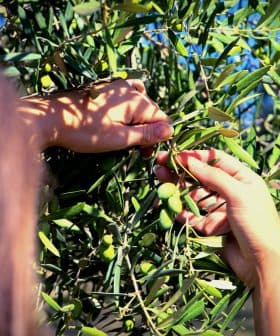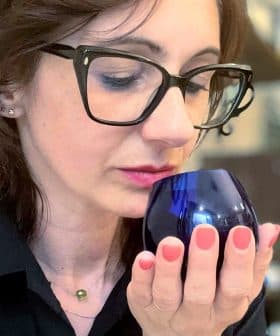Using Isotopic Footprints to Authenticate Olive Oil, Combat Fraud
In Umbria, researchers and farmers are identifying the isotopic profiles of local extra virgin olive oils to verify authentic products and add value.
A new certification system will confirm the origin and quality of extra virgin olive oil from Umbria, allowing producers to guarantee its features and properties to consumers. Isotopic traceability, based on specific characteristics, will help identify the origin of olive oil and combat fraud, with plans to expand the methodology to trace the historical roots of specific cultivars in the region.
A new scientific and legal certification will help confirm the origin of and promote extra virgin olive oil produced in the central Italian region of Umbria.
Producers who adopt the isotopic traceability system will be able to guarantee the origin, organoleptic features and beneficial properties of their extra virgin olive oils to the consumers.
This approach is meaningful not only for verifying the authenticity (of olive oil) but also to combat fraud. It allows us to protect and give value to specific high-quality products.
Widely used in other segments of the agri-food sector, such as wine and Parmigiano Reggiano cheese, isotopic traceability identifies extra virgin olive oil from Umbria using a specific set of characteristics.
See Also:Italian Trade Group Backs Pan-European Traceability Rules“Identifying the isotopic footprint of food means gathering a lot of information about its origin,” Luana Bontempo, a researcher at the Edmund Mach Foundation in Terni, told Olive Oil Times. “Isotopes are atoms of a single element differentiated by their mass; that is why in nature, we find them in different quantities. Their profile depends on many different factors.”
Those factors include geological characteristics of the land of origin, location, latitude, distance from the sea, temperature, rainfall and the fertilization procedures adopted in the area. They also incorporate the cultivar involved and the specifics of the olive oil production process. All of this information constitutes the olive oil identity card.
The contents of an extra virgin olive oil must match those listed in a database that researchers have compiled by examining local olive oil, soil and climate to trace its origin and define its footprint.
Bontempo and her colleagues from the local farmers’ associations Confagricoltura Umbria and the Assoprol Umbria OP initially focused on analyzing hundreds of olive oil samples from parts of Umbria with a Protected Designation of Origin certification.
The analysis allowed the researchers to understand the unique relationships among stable isotopes of bio-elements, which support the definition of a recognizable and verifiable footprint.
“In olive oil, we have investigated the isotopic relationships related to three bio-elements such as hydrogen, carbon and oxygen,” Bontempo said.
Once the footprint database has been created, the following isotopic analyses are quick and straightforward. The olive oil sample can be analyzed as it is, with none of the pre-treatments required for other technical procedures aimed at determining a product’s origin.
“This approach is meaningful not only for verifying the authenticity [of olive oil] but also to combat fraud,” Bontempo said. “It allows us to protect and give value to specific high-quality products and can be used both by official verification bodies and consortia that work to protect their products.”
Fabio Rossi, the president of Confagricoltura Umbria, said the project, which is financed with regional development funds, is a collective effort to make Umbria more effective at combatting fraud.
“Given the news that sometimes appears in the press, many consumers risk stepping away from high-quality, healthy olive oil,” he told Olive Oil Times. “So we need to offer them a verified and legally valid traceability system that can guarantee the origin and the contents of the extra virgin olive oil they are buying.”
After more than two years of research, the analysis confirmed a very clear isotopic footprint for Umbria extra virgin olive oil.
“In a few cases, it could be confused with extra virgin olive oil from the nearby regions of Tuscany or Marche, but it is very different if compared to Sicilian, Tunisian or Spanish olive oil,” Rossi said.
“Efficacy and robustness of this analytical approach are proven by the fact that in the last 20 years, the analysis of stable bio-elements isotopes has been recognized as an official method of verification,” Bontempo added.
“It is used for wine at the European level, for instance, to identify fraud such as water additions or exogenous sugar additions, as well as for the verification of the geographical origin and the year of production,” she said.
On top of the new verifiable traceability, Confagricoltura and its scientific partners are working on tracing back the historical and territorial roots of specific cultivars.
“We are investigating how, when and why those [cultivars] began thriving in the region, and we will add to that information the isotopic traceability,” Rossi said. “The consumers will not only know about the history of local extra virgin olive oils but they will also be informed about its composition and its specific health benefits due to the uniqueness of its locally-specific contents.”
The current methodology is quickly undergoing major changes that could soon open the door to widespread adoption of the isotopic analysis.
“The most recent developments in the isotopic approach aim at building isotopic predictive maps, iso-scapes, which would allow us to match the isotopic relationships with the characteristics of the product location of origin,” Bontempo concluded. “This would greatly reduce the need to build extensive datasets, which might be economically costly and time-consuming.”









